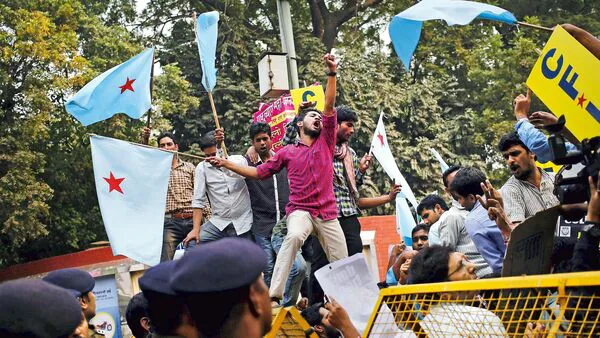
3-Year Jail Term, ₹10 Lakh Fine On Institutes: How Karnataka's Rohith Vemula Bill Aims To Curb Caste Bias On Campus
The legislation, which aims to prevent caste- and identity-based discrimination in higher education institutions in Karnataka, is being tabled following a push from senior Congress leader Rahul Gandhi, according to reports.
Also Read | Did Siddaramaiah take a dig at Shivakumar amid CM seat tussle? See cryptic postThe Bill is named after Dalit PhD scholar Rohith Vemula, who died by suicide at the University of Hyderabad (UoH) about a decade ago. The Bill, called The Karnataka Rohith Vemula (Prevention of Exclusion or Injustice) (Right to Education and Dignity) Bill, 2025, seeks to address the“caste realities” in higher educational institutions.
Key Provisions of the Bill- The proposed law seeks to address“direct, indirect and institutional discrimination and harassment” on the basis of caste, providing for“civil remedies for survivors in cases of discrimination and penalties on the perpetrator for harassment,” according to a report in the Indian Express.
-The civil remedies include raising a complaint before an Equity Committee, which would be similar to the Internal Complaints Committee for cases of sexual harassment, within the educational institutions. The matter could then be taken to the district courts and high courts, according to the draft Bill,
- A student, faculty member or non-teaching staff of any institution of higher learning can be an aggrieved person, according to the bill that largely deals with a wide spectrum of discrimination in“conduct, behaviour, omission, treatment, policy, custom, criterion or practice”.
What is the punishment in the bill?-The discrimination would be a cognizable and non-bailable offence.
-The Bill imposes different penalties on individuals and institutions for various offences under its provisions.
Also Read | Shivakumar says 'don't want to...' amid CM speculation-What we know so far-For individuals, the Bill prescribes a written apology to be the least of penalties when it comes to discrimination, stipulating stricter penalties for atrocities.
-The first offence can attract a punishment of one year imprisonment and a fine of ₹10,000, and a fine which may extend to ₹ 1 lakh.
-Repeat offences could result in a three-year prison sentence and a ₹1 lakh fine.
-If an institution violates the provision of being“open to all classes, castes, creed, gender or nation”, then it will attract a minimum penalty of ₹1 lakh and a maximum penalty of ₹10 lakh.
Why is the bill named after Rohit Vemula?The Bill, part of the Congress party's manifesto, was fast-tracked following a letter from Rahul Gandhi. The Karnataka Cabinet has discussed the bill, deferring it once for further consultation. It is expected to be introduced in the state legislature in the upcoming winter session of the Karnataka assembly.
In April 2025, the Leader of the Opposition in the Lok Sabha, Rahul Gandhi, wrote to Karnataka Chief Minister Siddaramaiah, urging the state to introduce legislation in Vemula's name to combat caste prejudice in educational settings.
Why is the bill controversial?-The bill has been widely debated.
-Supporters see it as a necessary measure to honour Rohith Vemula's legacy and protect marginalised students.
Also Read | Rohith Vemula case: Telangana Police to conduct further probe? DGP respondsCritics, mainly from the BJP, call it a political tactic, arguing existing laws are adequate and that the bill could lead to reverse discrimination.
Who was Rohit Vemula?PhD student, Vemula, ended his life inside a hostel room on the University of Hyderabad campus on 17 January 2016, weeks after he was expelled from the hostel over a dispute between his Ambedkar Students Association (ASA) and the RSS-affiliated Akhil Bharatiya Vidyarthi Parishad (ABVP).
My birth was my fatal accident.In his suicide note, Vemula protested caste discrimination, stating that“My birth was my fatal accident”.
Vemula's death triggered widespread protests across the country over alleged discrimination and harassment against Dalits and other marginalised communities in educational institutions.
Key Takeaways- The bill proposes severe penalties for caste-based discrimination in educational institutions. It introduces civil remedies for victims, ensuring a formal complaint process. The legislation is part of a larger effort to honour Rohith Vemula's legacy and address systemic injustices, the Congress has said.
Legal Disclaimer:
MENAFN provides the
information “as is” without warranty of any kind. We do not accept
any responsibility or liability for the accuracy, content, images,
videos, licenses, completeness, legality, or reliability of the information
contained in this article. If you have any complaints or copyright
issues related to this article, kindly contact the provider above.


















Comments
No comment